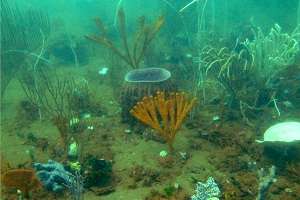Australian sponge survey driving medical research

Sponge gardens along WA's coast are proving to be a haven of new species—and many are playing an important role in new drug discoveries.
Dr Christine Schönberg from the Australian Institute of Marine Science (AIMS), based at the University of WA's Oceans Institute, says about one-third of species in every collection from WA represent new species with many appearing to be endemic.
A survey at Ningaloo Reef has shown local sponge gardens become prevalent in depths where corals recede.
Sponge biomass and diversity was extremely high, leading to the recognition of Ningaloo as a sponge diversity hotspot, which is a place with more than 250 different species.
"The total number of sponge species at Ningaloo was calculated to reach between 500 and 800, which is a lot when considering that we presently know about 8500 species of sponges in the entire world," Dr Schönberg says.
"We do not yet understand why there are so many sponges around Australia and research is ongoing to generate better knowledge on their requirements and possible threats to them.
"While many coral reefs are marine-protected areas, sponge gardens as a rule are not.
"In WA, sponge gardens have been significantly decimated by heavy fishing gear which, in turn, affected the catch rates of fish that need sponge gardens."
Many sponges collected across the State have been accessioned into the Western Australian Marine Bioresources Library (WAMBL) at the WA Museum.
WAMBL makes the samples available for researchers who want to conduct drug discovery research, according to AIMS project leader Dr Libby Evans-Illidge.
"Sponges have been demonstrated to be a rich source of novel metabolites with applications in human therapeutics, probably because sponges share so much metabolic machinery with humans," she says.
"Recent genome sequencing has shown all the essential animal traits that are so advanced in humans were already present 650 mya in sponges."
In sponges, metabolites (chemical compounds) are produced to help the sponge meet the many challenges of life in the sea.
"Sponges rely on chemicals to ward off predators, protect reproductive products, avoid being overgrown by neighbours, fight disease or recover from illness or injury," Dr Evans-Illidge says.
"One of the great things about sponge compounds is they are often highly potent which means they work at very low concentrations—and high potency is a desirable trait in a drug."
But Dr Schönberg warns that with many WA species being endemic, a patch of habitat may not only be lost when damage occurs to local sponge gardens but entire species may also become extinct.
Provided by Science Network WA


















